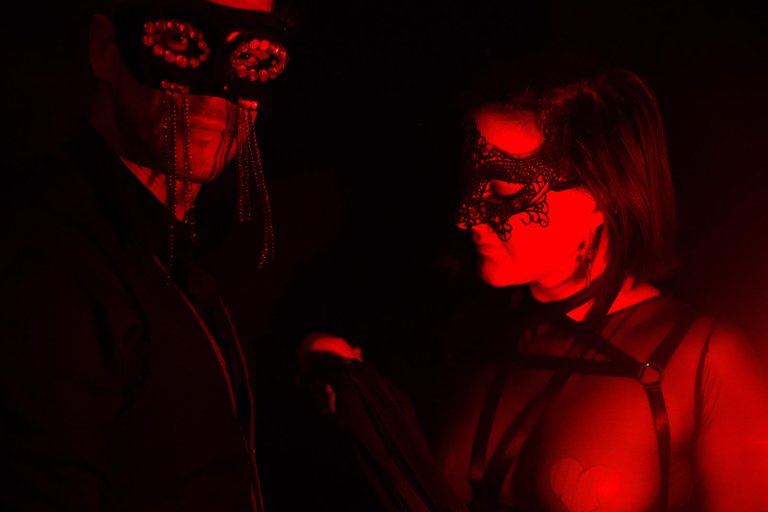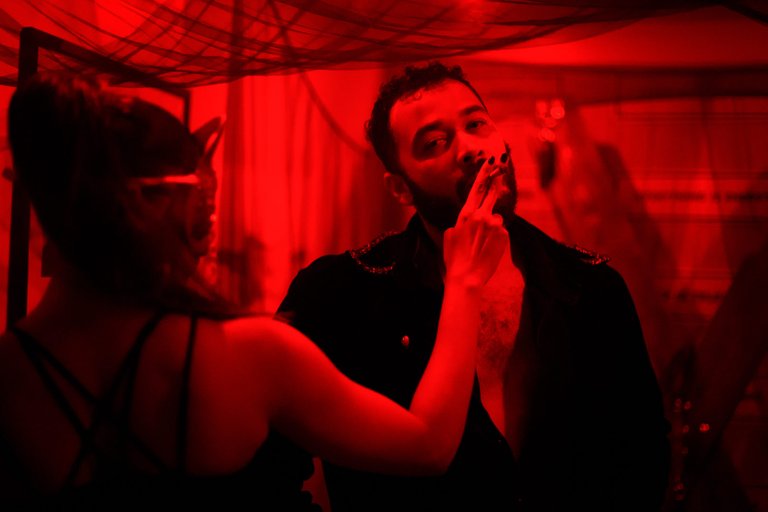
Brash, bold and bisexual, Daniel Saynt is an only-in-New-York success story.
Saturday has shimmered into Sunday at the Clubhouse. Inside a gray four-story building in Williamsburg, Brooklyn, the paid members, staff, and faculty of NSFW – part private sex club for millenials, part digital brand marketing agency – have gathered to drink, smoke and screw in between workshops about sex, cannabis and wellness.
In the basement, next to a king-size bed with a mirrored headboard, mistresses are dominating their submissive male partners, teasingly stroking their penises, squeezing their testicles and pinching their nipples. A woman with red hair and tasteful tattoos is being tied up. She’s doubled over across a bench that looks like something you’d do curls on at a gym. Her tall, bespectacled boyfriend begins striking her back and rear end with a cat-o-nine-tails dungeon whip. With witnesses moving through the space she screams pleasurably, then moans while her companion vigorously fingers her.
Upstairs, there’s a breakfast bar with glittering digital turntables, while about ten half-naked men and women partake in varying degrees of petting on mattresses laid out on the floor. A fit, shirtless dude smokes a joint and observes that the NSFW parties here at the Clubhouse are “a great place to be free.” Later in the night, he’ll be scampering about in boxers, and a little while after that he’ll be buck-naked.
Reclined on a leather sofa nearby, snuggling with his boyfriend while wearing studded Converse sneakers, a leather kilt, a black pirate ship captain’s jacket and a decorative crown of gold, is NSFW’s founder Daniel Saynt. Big and bearded, Saynt’s been mellow all night, opting to take in the reverie around him instead of dancing through the crowded apartment like some of his guests.
“I’m so tired,” Saynt, 34, says laughing, a few days after the party, his last big bash of 2017. “It’s nice to kind of finish this year off.”
It’s been a busy one. Just over a year ago, Saynt stepped down from his perch atop Socialyte – a digital marketing agency he co-founded with his ex-wife Beca Alexander – to run NSFW, which he founded three years ago, full time.
Saynt, who is bisexual, started his post-college years as a nightlife consultant and fashion blogger, founding Fashion Indie, which would become one of the most widely read – and controversial – sites in the industry. He was hired by the Rebecca Minkoff women’s handbag, shoe and apparel company as chief marketing officer, and later served as an executive vice president at the fashion magazine NYLON, after the publication merged with Socialyte. His client list has also included Lord & Taylor, Coach, Estée Lauder, and Condé Nast.
After taking on duties as “Chief Conspirator” of NSFW, he penned a post on his website titled “How Trump Inspired Me To Quit Fashion and Create ‘New York City’s Most Elite Private Sex Club,’” which NSFW was anointed by Maxim.
“Trump was attacking all the values that made America great,” Saynt wrote. Concerned recent LGBTQ rights legislation would be rolled back, Saynt continued: “I could see what was coming, a new regime ready to … discriminate based on their own antiquated ideas of sex and relationships, ready to destroy sexual wellness by defunding Planned Parenthood and ending support for a woman’s right to choose. It was sickening and more importantly, inspiring.”

![NSFW-2-1-427x640.jpg]
Thus, NSFW – “Not Safe for Work” in popular parlance, but in the case of his company “the New Society For Wellness” – is Saynt’s sexy answer to Trumpism. “Our goal is to spread positive messages about sex and cannabis, and to help educate people so they can become enlightened to their sexuality and to cannabis as a medicine,” Saynt said in a much quieter Clubhouse one afternoon a few days before the party.
With the average member 28 years old, there’s a not-your-grandpa’s-sex-club element to NSFW, along with a sign-of-the-times digital marketing component heavily reliant on social media promotions. NSFW works with pro-sex and -drugs brands to showcase their products within the space, and seated next to Saynt throughout the interview, in fact, was a life-size blonde sex doll named “Cheryl.” She was manufactured by the Austin-based, family-run company Real Love Sex Dolls – one of NSFW’s clients.
Randi Ragsdale, director of marketing and operations for Real Love Sex Dolls, says that through NSFW the company hopes to reach an open-minded audience, as sex dolls tend to attract so much negative press. “They have this shameful aspect to them,” she says, “but the reality is we sell hundreds and hundreds of them to couples and sexually active single males – just normal people.” Ragsdale adds that working with Saynt has helped the company “communicate with this sex-positive generation,” and they’re delighted to see their “ideologies gain traction on social media and through other channels.”
Cheryl and several other sex dolls were at the Clubhouse during the party, an event NSFW calls “Playdate” – basically a house party where “sex can happen.” About every month Playdate guests interact with the NSFW brands, watch demonstrations like “How to Squirt,” and take in courses like “How to Pickpocket,” “How to Cheat at Poker,” “This Class Sucks: An Oral Workshop,” “Learn the Ropes: A Class on Japanese Bondage,” and “How to Ask For Sex” – a cornerstone class that preaches “enthusiastic consent” as the only means of consent, and spotlights Saynt’s mission to create a safe space for his club’s members. (Saynt says NSFW has about 700 members, with hundreds more waiting to be accepted.)

Staff members called “guardians” police the parties, wearing red wristbands and ready to help if an attendee is making another feel threatened or even just uneasy.
Written in chalk on a wall during the Playdate were “The Rules”:
Ask before you touch.
Stay hydrated.
No sniffles in public.
Don’t be a creeper.
“After every event we send out a ‘Creeper Report’” – a rundown of people who were acting in unacceptable ways, such as gawking at other members and other behaviors – Saynt explains. Violators of the NSFW code of conduct might be required to take part in additional “training” – i.e. the “How to Ask for Sex” course – or be excommunicated entirely.
On the pot-centric side of NSFW there are “Danquets,” which Saynt describes as “cannabis supper clubs.” “We partner with various chefs throughout New York City who come in and create custom menus for our members to enjoy,” he says.
Saynt’s personal journey began a long way from the hipster Brooklyn scene of sex-and-drugs-based brand marketing. Born Daniel Santiago to Puerto Rican parents, he grew up surrounded by prostitution and gang violence in the Bronx of the 1980s and ’90s.
“We were pretty fucking broke,” Saynt recalls. “We were on welfare and Medicaid. It was very difficult for my parents.”
He and his parents lived for a time at his grandmother’s apartment along with an uncle and two of his cousins – whom he refers to as his brothers – after their father was imprisoned. (That uncle of Saynt’s eventually succumbed to heroin addiction and died.)
“I had to sleep in my grandmother’s room,” Saynt says. “My younger brother had to sleep in the bed with grandma [and] my other brother slept out in the hallway.”
During middle school, after a group of young drug dealers tried unsuccessfully to recruit Saynt into their gang, one of them pushed him down a flight of stairs. His family home-schooled him for a time after that.
But throughout Saynt’s youth there were flashes of a strong business sensibility. At 12, he briefly ran a massage parlor out of his grandmother’s home with a menu of treatments he’d administer to his grandmother and some of her friends. “I just made up massages; they were all named after different countries,” he recalls. “The All-American Massage” was “just a general massage” while “the India,” inspired by a bed of nails, had him repeatedly poking at sections of the body with his fingertips. Always an entrepreneur, on his way to school he’d sell healthy snacks like granola bars to straphangers.
“He was always the brightest one” in his family, says Christopher Rojas, one of the two cousins who lived with Saynt in the Bronx. “He was always focused in school, always trying to do his own thing. When he believed in something, he believed very strongly in it.”
Saynt’s parents – primarily his mother – also raised him as a Jehovah’s Witness. “In the morning you’d wake up at six a.m. to go preach,” Saynt says, “and all the crackheads are out, moving around slowly like zombies.”
While he knows his family remained in the religion in part as a means of “protection” from the chaos that surrounded them, being a Jehovah’s Witness led to some alienation for Saynt. He had limited time to spend with friends as the religion demands hours of weekly Bible study, church attendance and preaching – either by going door-to-door, making phone calls, or dishing out information on the streets. Members of the faith cannot date until they’re 18 – and even then can only see other Jehovah’s Witnesses, under adult supervision.
Further complicating matters was his sexuality, not welcome in the denomination. He says he had his first sexual experience at age 13, with another boy.
“There were definitely struggles that came with that,” Saynt says, recalling that other boys in school degradingly called him “gay,” which made him question his attraction to women. “Growing up in the Bronx there was so much machismo,” Saynt recalls. “When you’re trying to figure out who you are, it’s hard.”
For a while Saynt thought he might grow up to be a missionary, but by high school, he’d lost his faith. In addition to his sexuality, the release of “Jurassic Park” was an unlikely turning point. Saynt adored the film and recalls a Jehovah’s Witness magazine article reminding members that dinosaur bones are inventions of Satan meant to generate disbelief in Bible scripture. “I was like, Fuck no. Dinosaurs are real. I saw them on screen. I know what’s up,” Saynt says.
His parents eventually earned enough money to move themselves and their son to Monroe, a northern suburb of New York City, where Saynt spent the last couple years of high school. He started using drugs, mostly pot and ketamine, and stopped attending church. Still, he credits his religious upbringing with instilling his prodigious work ethic, and says all the preaching he did trained him to effectively communicate with conviction.
Throughout his tween and adolescent years, Saynt also developed a hearty passion for fashion. He remembers buying copies of Vogue and GQ to go with his X-Men comics. “The photos just made for what looked like an interesting life outside of what I was growing up with,” Saynt says. Fashion “was something I wanted to be a part of.”
Saynt moved back in with his grandmother so he could be closer to the Berkeley College campus in Midtown Manhattan, where he majored in e-commerce. After graduating he founded a nightlife consulting firm, and started going by “Saynt.”
“I would walk into a [nightlife] space, and being young, Hispanic and tan, I’d introduce myself as ‘Daniel Santiago’ and they’d send me to the kitchen,” he says. Santiago translates to “Saint James;” he injected the “y” because his mother thought the name otherwise “too Catholic.” (Jehovah’s Witnesses don’t pray to saints, only to God directly.)
His site Fashion Indie drew attention for some catty posts, such as one he wrote that criticized the physical appearance of Vogue editor André Leon Talley, calling him a “blimp” with bad teeth. When a female fashion blogger commented, “this is really pushing the limits,” Saynt responded with another blog post bashing her weight.
“We were trying to be funny,” he says of himself and his band of writers at Fashion Indie, who he calls “troublemakers.” “The way I wrote people thought I was an asshole, and maybe I was a little bit, but I was young and stupid.”
Among other fiery topics, he covered “how to crash a fashion show,” which prompted the New York Observer to sarcastically ask, “[I]s showing up uninvited really the best way for bloggers to gain entree to the orderly, hierarchical fashion world?” Saynt threatened the paper with a lawsuit because the negative spin compelled fashion show organizers to renege some event invitations to Fashion Indie. But he says he backed off when, after conferring with lawyers, he realized he’d have difficulty proving there were damages. Plus, the spat with the Observer had its perks. “We found that the article and stories covering the article after only increased our audience,” Saynt wrote in an email. “Traffic spiked around that time and we had more interest than before, being seen as rebels in the fashion world.”
Saynt met his ex-wife Beca Alexander at an event he’d organized for a fashion designer in 2007 and they were married a little over a year later. In September 2014 the pair founded Socialyte – a digital marketing agency that hires “online influencers” to spread word about brands.
The pair split after six years of marriage. Saynt says it was amicable, but that she was conflicted with his desire to start running a sex club.
“NSFW always scared her because it was an idea about a lot of people around having sex all the time,” he says. (Alexander declined to be interviewed for this story.) “She really needed someone who was there just for her, and I, just, am not there.”
The ideal romantic arrangement for Saynt is to have a boyfriend and a girlfriend – or maybe one day a husband and a wife. He currently lives in the West Village with his boyfriend Adam, who wished to keep his last name private. A 25-year-old nonprofit worker and sometime fire performer, Adam met Saynt on a dating app soon after Saynt split with his wife. Adam calls Saynt “compassionate and thoughtful,” and in Adam, Saynt may have found the perfect companion as he continues to build his vision for NSFW.
“Sex has always been of interest to me,” Saynt says. “I think being in an environment where there was a lot of repression and you couldn’t express yourself sexually, it was difficult. It’s just wanting that thing that you don’t have.”
Sayt says his relationship with his parents, who remain in the church, is better than it’s been, having found a degree of mutual respect. But there are ups and downs. “It’s frustrating because it’s similar arguments often,” he says, adding that they know a bit about what he does, but don’t seem to grasp the scope of it. “Most of [the conflict] comes from a concern and a worry to make sure that I’m O.K. But for the most part I love them very much. I want to be closer to them.”
None of Saynt’s family members have been to his sexy parties, though his cousin Christopher Rojas will help with handiwork at the Clubhouse sometimes.
In looking forward to building upon the success of NSFW, Saynt wants to do more pop-up parties in other locations, and maybe even one day see “How to Ask for Sex” in a university course catalog.
“There’s something that’s been taken away from us when it comes to sex, and with cannabis,” Saynt says. His mission with NSFW, “is really just taking back some of that and being able to have more ownership over how we can enjoy this world. That’s not necessarily primal, that’s pure.”
Story by Michael Stahl
Photos by Katia Repina
source:http://narrative.ly/jehovahs-witness-kid-became-millennial-sex-club-guru/